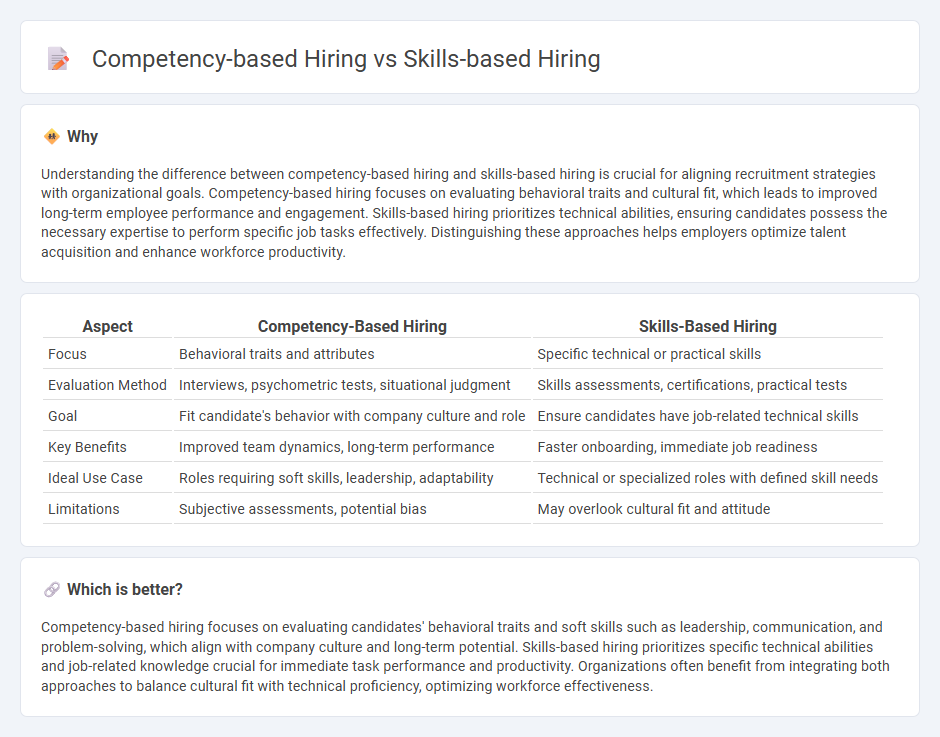
Competency-based hiring focuses on evaluating candidates' behavioral traits and proven past performances to predict future job success, while skills-based hiring emphasizes specific technical abilities and measurable expertise required for the role. This approach enables organizations to align recruitment strategies with organizational goals and ensure cultural fit alongside job proficiency. Explore detailed insights to understand which hiring method best suits your workforce needs.
Why it is important
Understanding the difference between competency-based hiring and skills-based hiring is crucial for aligning recruitment strategies with organizational goals. Competency-based hiring focuses on evaluating behavioral traits and cultural fit, which leads to improved long-term employee performance and engagement. Skills-based hiring prioritizes technical abilities, ensuring candidates possess the necessary expertise to perform specific job tasks effectively. Distinguishing these approaches helps employers optimize talent acquisition and enhance workforce productivity.
Comparison Table
| Aspect | Competency-Based Hiring | Skills-Based Hiring |
|---|---|---|
| Focus | Behavioral traits and attributes | Specific technical or practical skills |
| Evaluation Method | Interviews, psychometric tests, situational judgment | Skills assessments, certifications, practical tests |
| Goal | Fit candidate's behavior with company culture and role | Ensure candidates have job-related technical skills |
| Key Benefits | Improved team dynamics, long-term performance | Faster onboarding, immediate job readiness |
| Ideal Use Case | Roles requiring soft skills, leadership, adaptability | Technical or specialized roles with defined skill needs |
| Limitations | Subjective assessments, potential bias | May overlook cultural fit and attitude |
Which is better?
Competency-based hiring focuses on evaluating candidates' behavioral traits and soft skills such as leadership, communication, and problem-solving, which align with company culture and long-term potential. Skills-based hiring prioritizes specific technical abilities and job-related knowledge crucial for immediate task performance and productivity. Organizations often benefit from integrating both approaches to balance cultural fit with technical proficiency, optimizing workforce effectiveness.
Connection
Competency-based hiring and skills-based hiring both focus on evaluating a candidate's specific abilities and qualifications that align with job requirements. Competency-based hiring assesses behavioral traits and attributes essential for job performance, while skills-based hiring emphasizes technical expertise and practical skills relevant to the role. Together, these approaches create a comprehensive evaluation framework that enhances talent acquisition by matching candidates' capabilities with organizational needs.
Key Terms
Job Requirements
Skills-based hiring targets specific abilities directly linked to job tasks, emphasizing measurable technical proficiencies and certifications that match the position's requirements. Competency-based hiring evaluates a broader range of attributes such as behavioral traits, problem-solving abilities, and interpersonal skills crucial for long-term success and cultural fit. Explore how aligning recruitment strategies with your organization's core needs enhances workforce effectiveness.
Assessment Methods
Skills-based hiring emphasizes evaluating candidates through practical tests and demonstrated abilities directly related to job tasks, ensuring immediate job readiness. Competency-based hiring assesses a broader range of attributes, including behavioral traits, problem-solving skills, and cultural fit, often using structured interviews and psychometric tools. Explore detailed comparisons to understand which assessment method aligns best with your organization's talent acquisition strategy.
Performance Metrics
Skills-based hiring targets specific abilities and practical expertise demonstrated through measurable tasks, streamlining candidate selection for immediate job requirements. Competency-based hiring assesses broader behavioral traits and core capabilities aligned with organizational values, emphasizing long-term performance and cultural fit. Explore in-depth comparisons to determine which hiring approach best enhances your workforce effectiveness and performance metrics.
Source and External Links
Skills-based hiring - Wikipedia - Skills-based hiring is the practice of employers setting specific skill or competency requirements for jobs, allowing applicants to demonstrate skills independent of academic degrees, often assessed via third-party tests to match candidates' skills with job needs efficiently.
Skills-Based Hiring: Why It's Time to Rethink Hiring - Radancy Blog - Skills-based hiring prioritizes candidate abilities over traditional credentials like degrees, expanding talent pools and fostering diverse teams, with adoption rising from 57% in 2022 to 81% in 2024 amidst ongoing talent shortages.
Why Skills-Based Hiring Is so Revolutionary - Workday Blog - This approach focuses recruitment on candidates' hard and soft skills rather than their education or past job titles, helping employers broaden qualified candidate pools, with 52% of US job postings in 2024 dropping formal education requirements in favor of skills assessments.
 dowidth.com
dowidth.com